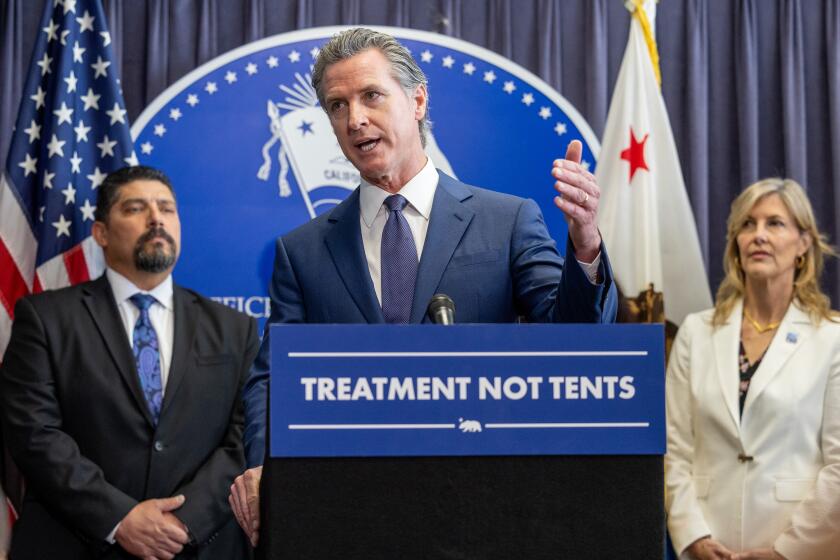Rated R for ridiculous
THE MOTION Picture Assn. of America and the National Assn. of Theatre Owners last week heralded a “reform” of their film ratings system, which assigns the ratings G, PG, PG-13, R and NC-17 to most films released in this country. Unfortunately, the MPAA’s changes are almost entirely cosmetic and only go a small way toward fixing a broken system — a system so closed to public scrutiny that no news organization had been able to disclose its workings until they were revealed in the documentary “This Film Is Not Yet Rated,” which I directed.
Despite protestations to the contrary, it appears that the film shamed the MPAA into paying lip service to its critique. As the film revealed, the association has been violating its own rule that raters must have school-age children, and it has refused to allow filmmakers to refer to other films when they appealed a rating. Both absurdities will be fixed.
But these are minimal changes. All of the fundamental problems of the ratings system remain: its secrecy and lack of accountability, its bias against independent and gay filmmakers and its excessive concern with sexuality while rating violence much less restrictively.
For nearly 40 years, film ratings in the United States have been decided by a secret board. Although the MPAA now plans to announce the names of three of the 11 film raters, the majority will still be anonymous. The MPAA claims their names are withheld to protect the raters from influence. But there are many people in society who make important decisions — judges, school board officials — whose identities are not shielded. In fact, by knowing who is making these decisions, the public is better able to discover improper influence.
The MPAA also refuses to release the names of the members of its appeals board, which is the final arbiter in the ratings process. This is particularly troubling because the appeals board is almost exclusively made up of executives from corporations that belong to the MPAA or the theater owners association, the very corporations that stand to gain the most from influencing a rating.
The MPAA claims the ratings system is for the public. If it’s truly for the public, it should be public.
Not surprisingly, conflict of interest is at the root of the problem. In addition to overseeing the ratings system, the MPAA is also the trade organization and lobbying arm of Hollywood’s six major film studios, which collectively own more than 95% of the U.S. film business. This explains why studio films with excessive violence time and again receive unreasonably light ratings, granting them greater access to the highly coveted teenage audience. On the other hand, films made or distributed by the studios’ competitors — independent and foreign film companies — which more often contain adult sexuality, are rated much more harshly, often receiving an NC-17 rating.
The ratings board does all of this in the name of “protecting children,” even though most media experts believe that exposure to violent media is far more damaging to children than exposure to sexual media. In most of Western Europe, ratings systems are much more restrictive of violence than sex.
Even more disturbing, the ratings board, as my documentary clearly demonstrates, rates films with homosexual scenes much more restrictively than films with similarly shot scenes of heterosexuality. But the MPAA has refused to disavow its discrimination against films with gay content.
When asked in “This Film Is Not Yet Rated” why gay films were rated more restrictively, Kori Bernards, the MPAA’s vice president of publicity, said that “we don’t try to set the standards, we just try to reflect them.”
This is appalling. If the MPAA thought that the country’s standards were racist, would their ratings reflect that racism? If the standards were anti-Semitic, would the ratings reflect anti-Semitism?
The MPAA should be called on to publicly state that no film shall be rated more restrictively on the basis of the race, religion, ethnicity or sexual orientation of its characters.
Censorship of films with sexual content actually serves the MPAA’s political interests in Washington. One of the MPAA’s primary objectives is lobbying Congress to pass laws favorable to the film studios. By harshly rating films with sexual content, the MPAA has curried favor with conservatives in Congress who have rewarded them by passing a number of very onerous intellectual property laws that have added billions of dollars to film studios’ coffers while greatly restricting the development of new art forms and new technologies.
An effective and unbiased film ratings system is of great importance to parents, educators, film audiences and filmmakers. If the MPAA is going to continue to oversee the ratings system, it must make some real changes: reveal the names of all members of the ratings and appeals board, disavow homophobic discrimination and place more restrictive guidelines on violence rather than sex. The sooner it makes these changes, the better.
More to Read
Start your day right
Sign up for Essential California for news, features and recommendations from the L.A. Times and beyond in your inbox six days a week.
You may occasionally receive promotional content from the Los Angeles Times.






